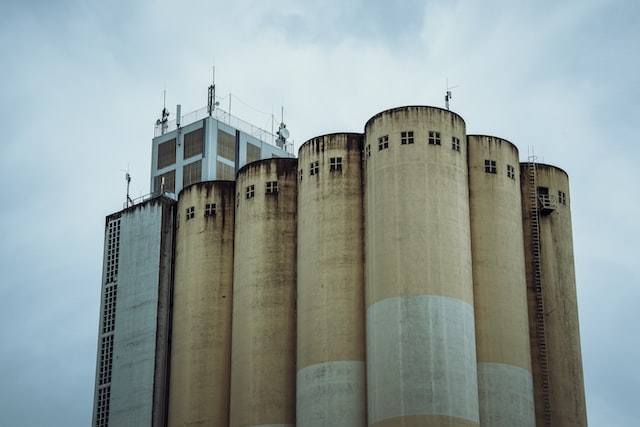Why We Like It: “Here or Somewhere Else, or, The Grain Silo” by Sharon Kunde
3 Minutes Read Time

Associate Editor Connor Yeck: Sharon Kunde’s “Here or Somewhere Else, or, The Grain Silo,” which appeared in our Issue 19.2, reminds me of the sort of poem that got me writing in the first place. Every surface has texture, and each line a sensation of building speed. We hurtle toward something—a place, a time, a revelation—and are in the presence of a voice that asks us to turn to the window and truly look at the lands that are passing.
This is a poem that transmutes background to foreground. As our speaker and sons “slide through solsticed Illinois on snowscab-moated tracks,” the horizon becomes a collage of agri-industry, desolation, and waning light. The sky is a “petro-shroud” over “worn-out fields” and “junked cars, enough to pave the earth,” while familiar structures take on monstrous proportions. The “fat black / tankers of crude” are a “coven of Mephistos.” A clump of neon signs for gasoline: “purgatory sun- / flowers, ubiquitous yellow M.”
I’m always caught off guard by just how quickly Kunde transmutes the all-too-familiar Midwest into this dreamlike vista. Among these vignettes, she calls back to Robert Frost’s “The Wood-Pile,” from which Kunde’s title is partially inspired: “. . . I’m not lost,” our speaker declares, “(no Frost, I know exactly where I am: these tracks lead to / the Golden West).” It’s a startling aside that I love, adding even more belief and heft to the journey at hand. We’re descending, willingly, and going just where we need to, away from “the ones who raised me,” who “lie behind . . . in rust-rough opiate towns.”
The image that stays with me most, however—from the moment I opened the poem in CR’s submission manager—is this: “Deranged Stonehenge, three silos stand, / meteorites jammed in clay, gone dark.” It’s something about the way we slip toward a terrain that seems prehistoric, even inhuman at times. But it’s exactly here Kunde begins the intimate chronicling of human disaster. How, “Some few years back, / [in] a nearby town” teenagers Alex Pacas and Wyatt Whitebread perished in a grain silo, asphyxiating under “eight thousand tons of corn, the ruined prairie’s load.” This moment of catastrophe becomes a suspended second where the gargantuan and fragile meet, a tender reminder of the speaker’s own sons, “clean as new-peeled corn”:
. . . What was it like
to walk on that grain river, to feel the golden squelch,
the close rich breath of such abundant fuel? To feel the ankle
tug and swirl, to slide inside consumptions’s smoldering guts?
Here, learning that Consolidated Grain and Barge denied liability for these deaths, the poem enters a dizzying ascent—what I once described in a CR blog on poem endings as reaching “escape velocity.” Along the desolate railway, “barnyard lights grow bright and sinister,” while “Back home, at LAX, a thousand thousand / planes lift off above the sea.” Our speed is increasing, and time is passing—“The sky is cracked. The sun’s too much”—until we at last face “The dark that’s coming. // The dark that’s here.”
Kunde leaves us with this darkness, but also the luminous vitality of poetry as record and remembrance, a belief in stories obscured by their own landscapes. Reaching the poem’s end, I’m left with the ghostly sense of moving while standing still. Or, better yet, the edge we ride on any night journey as drowsing passengers—to be surrounded by motion that any moment might lull us to sleep, or rock us back awake.
